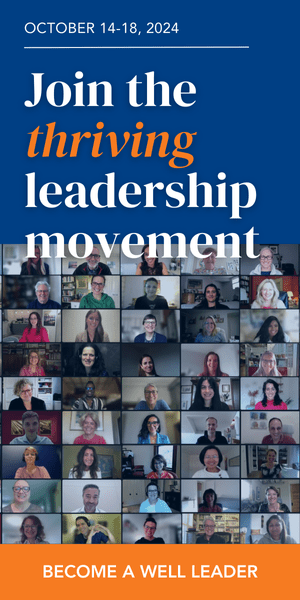 A profound redefinition of leadership is underway, one where truly effective leadership is about uplifting people and whole systems to new levels of resourcefulness and capability, sustainable growth, and wellbeing. I am inspired by people who have this calling in their bones, way-showers that support thriving in themselves and others.
A profound redefinition of leadership is underway, one where truly effective leadership is about uplifting people and whole systems to new levels of resourcefulness and capability, sustainable growth, and wellbeing. I am inspired by people who have this calling in their bones, way-showers that support thriving in themselves and others.
One of those people is Alicia Mandel, former Chief Learning Officer for the global Apollo Education Group. Alicia is now a Principal at Medius Advisory Group, taking on a consulting role to positively impact many organizations, not just one. I met Alicia years ago when she was CHRO at the United States Olympic Committee (USOC); our connection was immediate and genuine. She’s been on a journey to lead wellbeing for decades, and I’m delighted to share her story as part of Wisdom Works’ Face of Wellbeing Leadership series.
Me: Why do you believe leaders should proactively advance wellbeing?
Alicia: Great question. Back in the day, I led the Employee Engagement Group at American Express. I learned then: true employee engagement translates into people being the best they can be at work.
Let’s face it. We spend many hours working every day. Too often, people prioritize the work path they are on (or that others think they should be on) over ones that would really make them thrive. I’ve heard people say, “I’ll just hang on to this job until my stock vests, and then I’ll finally live the life I want” … only to have a heart attack.
While we’re waiting for a future in which we live fully, every day that goes by the toxic work environment we’re in is eroding our health and wellbeing. We only have a short amount of time on this planet. So we owe it to ourselves to work in situations that allow us to bring our best selves to the work we’re doing.
When I worked at the USOC, I learned how coaches and athletes take a holistic approach to attain elite performance. The swimmers don’t just swim. They sleep and rest well. They get excellent nutrition. They have a psychologist helping them with emotional barriers that might get in the way of success.
Yet in the business world we don’t do that. We perform, perform, perform … and even though we don’t take care of our whole selves, we expect to keep performing well. It doesn’t work. One of the best ways we can be successful is to take care of what enables us to thrive.
Me: Most of your roles in business have included developing the leadership talent required for organizational growth. For you, how does wellbeing relate to building effective leaders?
Alicia: I believe everyone is a leader. As employees, we all lead … we lead projects, we lead families, we lead relationships. So what each of us can do to create a thriving workplace is to have the courage to ask for what we need. Second, we can act on our expectation that the workplace is one where we can succeed as whole people. For example, I know personally that if I don’t have enough sleep, I don’t perform well. So when I’m on a team that travels a lot, has erratic work schedules, or is on call 24/7, I voice how important sleep is for us all. In this way I’m reminding us to build sleep into the way we think about performance. As employees, we influence the work environment; we are not passive players in it.
Everyone with a formal role of leadership should remember they are dealing with human beings, not robots. Leaders should ask, “How can we foster the conditions that bring about growth and vitality of people?” And they have to be patient enough to allow this kind of growth to occur. A good mentor once told me, this means doing three things: 1) act as a resource to help people thrive; 2) help remove barriers that are getting in their way; and, 3) be the cheerleader that authentically motivates.
Me: I totally agree with what you’re saying, Alicia. The role of a good leader is more about helping people address and take responsibility for what helps them thrive, plus continually redesigning the organization so that human thriving is central. In that vein, a big trend we’re tracking is the emphasis on mindfulness – the ability to observe without judgment and with compassion – which is increasing in business. Are you seeing this trend in your world?
Alicia: In the corporate world I live in, organizational support for mindfulness is lagging. Individuals are passionate about it however; they are taking yoga classes, meditating, doing tai chi, working on their emotional intelligence, you name it. And with stress, acquisitions, and competition rising in business globally, I personally believe the focus on mindfulness will grow. In fact, organizations that embrace mindfulness as part of the work experience will be better at attracting the Millennials; life and work for that generation doesn’t have clear boundaries, and to thrive in a boundaryless world, the ability to be more mindful – and choice-full – is key.
Want to meet other incredible wellbeing leaders? Take a look at our Face of Wellbeing Leadership series, or contact me at renee@wisdom-works.com.
READ MORE






